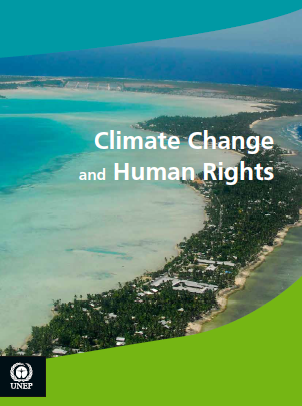by Iva Lea Aurer*
 The historic judgment rendered by the District Court of the Hague on May 26, 2021 represents a new understanding of corporate liability in regards to the risk of harm caused by their contribution to climate change. The court ordered Royal Dutch Shell (“RDS”) to reduce its emission by net 45% by 2030 in comparison to levels in 2019 – although without assertion of any unlawful conduct by the defendant (link to the judgement in English here).
The historic judgment rendered by the District Court of the Hague on May 26, 2021 represents a new understanding of corporate liability in regards to the risk of harm caused by their contribution to climate change. The court ordered Royal Dutch Shell (“RDS”) to reduce its emission by net 45% by 2030 in comparison to levels in 2019 – although without assertion of any unlawful conduct by the defendant (link to the judgement in English here).
Background
In April of 2019, Milieudefensie, as well as 7 other NGOs and 17 379 private individuals, started a lawsuit against RDS seeking: (i) reduction of (net) 45% by 2030 compared to 2019; (ii) subsidiary reduction of 35% or (iii) reduction of 25% by 2030 compared to 2019. Plaintiffs argued that as Shell’s contribution to emissions is measurable and substantial (historic emissions associated with its production and sale of fossil fuels amount to approximately 1.8% of total global emissions, according to the Climate Accountability Institute, and its current share is around 1% of annual emissions), and therefore significantly contributes to the risk of harm to present and future generations’ interests, both in the Netherlands and abroad, it constitutes tortious behavior. They grounded defendant’s liability on violation of the unwritten standard of care, considered from the standpoint of 6:162 of the Dutch Civil Code, Dutch case law, and human rights.
Judgment
The court confirmed standing interests of NGOs representing Dutch public interests (§4.2.2.). The standing of ActionAid and individual claimants was declared inadmissible. In the case of ActionAid, the court found the organization did not meet the requirement of similar interests insofar as they serve the interest of the global population. In the case of individual citizens, the court found their interests are already served by the collective action. Despite arguments by RDS, the court has asserted the applicability of Dutch law as the interests served by the collective action are those of Dutch citizens (more precisely citizens in the Netherlands and Wadden region) and within the territory of the Dutch state.
The court concluded that RDS has an obligation of net 45% emissions reduction by 2030 compared to levels in 2019 (§5.3). It derived said duty from the unwritten standard of care, as stated in 6:162 DCC, which entails that RDS has to exercise due care when creating group policy for Shell Group. It asserts that the full scope of the due care is considered by taking into account all relevant facts and circumstances of the case, the best available climate science, and broad international consensus on the protective effect of human rights against dangerous climate change. In the elaboration of the assessment (§4.), the court asserts a few important remarks:
- RDS has a duty of care as it creates policy for the whole Shell Group, and especially so as it is a major global emitter, therefore contributing to global warming in the Netherlands and Wadden region;
- due to the destructive character of dangerous climate change on the right to life and undisturbed family life of the citizens in the Netherlands and Wadden region, and due to the fundamental importance of human rights and societal values they embody, RDS has an obligation to decrease its emissions and therefore its contribution to climate change;
- the United Nations Guiding Principles on Business and Human Rights represents the global standard of corporate conduct which entails preventing and mitigating, and when applicable remedying, negative effects on human rights seeing as corporation themselves might contribute to those effects through their activities or business chains;
- the factual necessity of corporate proactivity and global consensus on corporate responsibility in tackling climate change, as complementary to state action, therefore rendering RDS, due to its size and impact, responsible beyond just simple compliance with regulation and social changes;
- the UN Sustainable Development Goals must not to be interpreted as detracting from the goals of the Paris Agreement as both are intrinsically linked;
- RDS’ emissions covered by the European Union Emissions Trading System are taken into account when deliberating on its emission reduction obligations, which is the reason why RDS’s policy in this regard need not to be adjusted, but only in regards to the emissions not covered by ETS;
- it cannot be concluded that another company would take over RDS’s market share, especially as it would have the same responsibility as RDS, but above all else as the emission reduction obligation is universal;
- interests protected by emission reduction carry more weight than commercial interest of Shell Group, rendering the emission reduction targets proportional to RDS’ contribution to dangerous climate change and corollary high risk to human rights.
The result of these considerations, in the court’s view, is that RDS has the obligation to reduce CO2 emissions by net 45% by the end of 2030, compared to 2019, based upon the IPCC’s scientific conclusion of the cruciality of this particular reduction pathway in preventing warming past 1.5˚C. The aforementioned obligation differs in regards to Shell Group and business relationships and consumers. In regards to the former, it has an obligation of result, meaning the net 45% emission reduction has to be achieved across the whole Shell Group and in regards to scope 1, 2, and 3 emissions by 2030. In regards to the latter, it only has obligation of conduct, meaning it has to take all necessary steps to prevent realization of the risks and to minimize any consequences.
The court acknowledged that RDS has policy in place, as well as that it is changing and adapting its policy. However, the court also concluded that the policy is vague, with weak wording of intent, non-binding, and with no emission reduction targets for 2030. Therefore, the current RDS policy does not preclude emission reduction obligations – even more so, the court asserts aptitude of the injunctive relief as the current state of affairs indicate imminent violation of the emission reduction obligation.
A few comments
The judgment by the District Court of Hague is unprecedented and showcases the development in legal thinking – regardless of the almost certain appeal by RDS. The focal issue of this case is the applicable standard of care as a result of weighing of interests, which is dependent on the hierarchy on desirable values and important interests of the society and locality in question at that point in time.
The relief sought by the claimants implies current weighing of future interests. This task is made easier by the court’s focus on emissions reduction by 2030, rather than a longer focus on 2050 when interests may be more uncertain. Moreover, the court acknowledges the existence of various interests globally, but limits its assessment to the interest of Dutch citizens. This may bolster the emission reduction order from attacks that the court is not able to assess global interests with legal certainty.
Additionally, the court has justified the emission reduction target by both referring to the greater importance of non-pecuniary interests, versus pecuniary interests, as well as asserting that the same standard of care will apply to every other actor. In other words, the court has asserted responsibility of all, both public and private, for emission reduction, even in the face of high upfront costs.
Unlawful act
The basic postulate of tort law is the duty to observe due care when engaging in potential harmful activities. In other words, tortfeasors will be held liable for the damage they should have foreseen and could have mitigated. The yardstick of foreseeability is that of a reasonable person in similar circumstances. In this case, the existence of a duty of care was determined by looking at facts (e.g., the effects of CO2 emissions on the Netherlands or the policy-making status of RDS), historical and present circumstances (e.g., knowledge on the linkage between emissions and global warming), science (e.g., outcomes of mitigation pathways), international law (e.g., the effect of UN Guiding Principles or human rights), and legal doctrines (e.g., onerousness or proportionality of the reduction order).
The court found that RDS, although allegedly not in possession of any unique knowledge on climate change, knew enough to foresee the damage its emissions will cause or are likely to cause. As time went on, the certainty of this damage became clearer. In addition, RDS is the body that creates the general policy for the Shell Group – the policy that led to its current share of global annual emissions being around 1%. The policy has a direct influence on the conduct of the Shell Group, and, by determining the energy packages that are offered, has an indirect influence on business relations and consumers. Consequently, the emissions facilitated by that policy can be linked to the temperature rise in the Netherlands which puts at risk the life and quality of life of Dutch citizens. This is the first case in which a court has confirmed corporate duty of care for harm, or risk of harm, caused by climate change – a necessary development of contemporary legal doctrine in the face of increased climate impacts stemming from corporate activity.
Human rights effect
The court’s reasoning on the contribution of human rights and intergovernmental treaties to the weighing of interests is somewhat less clear. Namely, legal certainty (partly) relies on the understanding of the delineation between powers and responsibilities of public and private entities, and the different interests they uphold and represent. The underlying assumption of the treaties is that the state, as the entity protecting public interests, will implement the obligations set in those treaties. Courts should be explicit in characterizing the way international treaties set obligations on private entities.
While elaborating the effect of human rights on the assessment of standard of care (4.4.9.), the court notes statements of the UN Human Rights Committee and Special Rapporteur which conclude that the norms of human rights apply to climate change. Next, it deducts that from the UN Guiding Principles, OECD Guidelines, and other soft law instruments, corporations need to respect human rights, notwithstanding state human rights obligations, and actively prevent, mitigate, and remedy violations thereof. The court concludes, based on these statements’ principles but not the specific wording therein, that companies themselves can contribute to the harm of human rights, be it through their activities or business chains. Although the meaning of this conclusion makes sense morally, it may face challenges that it lacks legal certainty.
A legal obligation is enfeebled if it is construed upon legal instruments that have intentionally and explicitly renounced their legally binding character; be it for the reasons of avoiding additional duties for the addressees, or of avoiding threading into the domain of public interests and states’ powers. Renouncing the importance of wording within the treaties, which is the main mean by which law regulates and obliges, undermines legal certainty. This, however, does not preclude the potential of wording of intergovernmental treaties to lend meaning to national standards of due care – within the confines of the substance of the words used.
While the progressive thinking of the court is remarkable, as well as its dedication to the protection of human rights and interests derived therefrom, the concrete effect of this decision on the international community is yet to be seen. With that said, the lack of perfection does not diminish the significance of the decision; not only has it opened the doors of the legal arena to corporate climate liability, but has also invited climate justice to the table – and just in the nick of time.
*Research associate, Vrije Universiteit Amsterdam, Faculty of Law
Tiffany is the Communications Associate at the Sabin Center for Climate Change Law.




